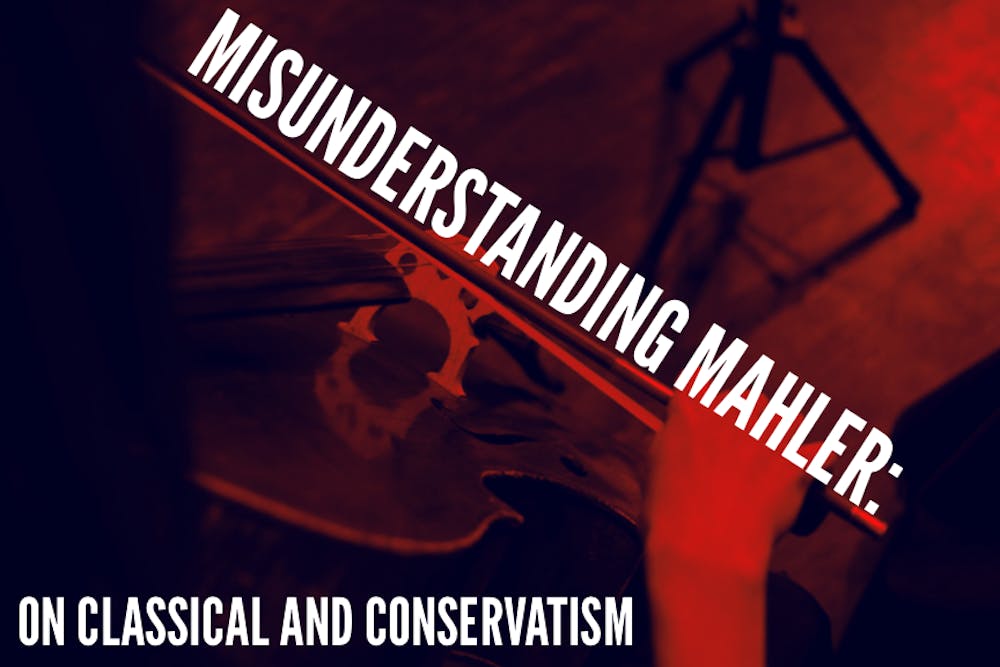There’s a certain sort of classical music fan: He’s young. He identifies as some flavor of conservative or right-wing or trad. He idolizes the “the West” and its “Canon.” When he attends a classical concert, he makes a big deal of dressing well — and his idea of “dressing well” is dressing like it’s 1945.
Last Friday, I went to see the South Bend Symphony Orchestra play Mahler’s Symphony No. 5 at the Morris Performing Arts Center. As always with classical concerts, the lion’s share of the audience was middle aged or elderly.
This demographic is, for the most part, non-ideological. There are boomer liberals present to seem cultured, and there are boomer conservatives present simply because it’s old, but mostly, this demographic comes because they were raised on it. They genuinely love classical music. While this cohort is essentially centrist, I’ll concede that it skews well-off.
But for the young conservative — the type I described above — listening to classical music is an explicitly ideological act. To him, it’s even a form of political praxis. He considers classical music “transcendental” and “pure” and everything else “crass” and “degenerate.” He imagines classical music as a knight in shining armor facing off against the two great boogeymen of his worldview: “wokeism” and “rap.”
A fan of classical music myself, I find this genre of enthusiast repulsive. He can't actually listen to the music; instead, he can only listen to himself listening to the music. He pretends his motive is the praise of composers and conductors and virtuosi — great, heroic, romantic men; really, his aim is the praise of his own good taste. And in making classical music into politics, he demolishes it as art. This mindset begets perversion and misunderstanding.
I’m reminded, for instance, of a time I attended a Notre Dame Chorale concert. As I settled into my seat, a herd of men roved in. They were all in uniform (the most Mendoza College of Business suits you could possibly imagine) and there wasn’t a single woman among their ranks. They were members of some conservative student organization, no doubt — maybe the de Nicola Center for Ethics and Culture, maybe the Right to Life club, maybe the College Republicans, maybe The Irish Rover.
Their performative formality peeved me. Up to a point, I understand the desire to demonstrate respect for the music — you make an effort to be quiet as can be, to clap even when it’s just okay, to be polite. But at a classical concert, the performance is what's on stage, not the clothes in the audience. Richard Wagner, who they surely idolize on account of his cult of genius and vilification by liberals, agrees with me on this point: he designed his opera theater to keep eyes on the action and to prevent aristocrats from ogling at each other’s evening dress.
I’m reminded, too, of last Friday and of Mahler’s Symphony No. 5. Conservatives make classical music a “high” and “spiritual” art because they suppose it comes from a higher and more spiritual time. They turn men like Mahler into half-tortured geniuses and half-theosophists.
But please, that’s a joke! Sure, he was a tortured genius, but Mahler was pop through and through. The man started his career conducting cheesy operettas with provincial orchestras at spa-resorts, and you can tell. The over-the-top instrumentation he became notorious for (e.g. the literal whip in Symphony No. 5) is straight out of those Italian melodramas. He pulls tunes from everywhere, from high and low, from parade marches and peasant dances and klezmer numbers and folk songs.
Conservatives think Mahler — and classical music as a whole — represents the conquest of the crass by the pure, the profane by the sublime, when really, Mahler’s genius is his ability to transform profanity into sublimity. “A symphony must be like the world,” Mahler once said, “it must embrace everything.”










